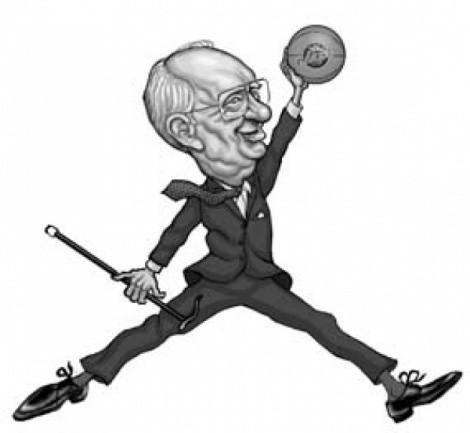
Turns out that, if not for Hinckley, there might never have been two decades of Stockton-to-Malone, or D-Will to Booz, or an All-Star game, or two NBA Finals, or nightlife as millions of Utahns have come to know it—all taking place just a couple of blocks from Temple Square. In fact, the next time you buy a beer at a Jazz game, giving thanks that you have the chance to watch the best basketball players in the world on an otherwise cold and dreary winter night in sleepy Salt Lake City, raise a toast to GBH. The brother recognized the importance of ballin’ it up in the Beehive State when nobody else seemed to.
The Jazz would have been long gone from Utah years ago if Miller hadn’t stepped up in 1985 and made what at the time seemed to be an astoundingly stupid business decision: borrowing $8 million to buy 50 percent of a basketball team that had lost $17 million over its 11 seasons of existence, and it wasn’t drawing very well in Salt Lake City. While trying to figure out whether to buy the team in April of 1985, Miller called on then-apostle Hinckley, who was still a good decade away from becoming the franchise player for the LDS Church. Hinckley told Miller it was important for the church that there be an NBA team in the Beehive State. His reasoning was that the prevalence of NBA scores and news in modern popular culture would keep the name “Utah” in the news. And, any time the word “Utah” was heard, the word “Mormon” wouldn’t be far behind in the minds of those who heard it. Furthermore, although Hinckley might not have put it as such, was there the notion that people might think to themselves, “How weird could the Mormons really be if they like NBA basketball?”
Whether or not you think Hinckley had actual heaven-inspired visions, he was certainly ahead of the curve on this one. In April of 1985, ESPN was in its relative infancy, the NBA still had a reputation as a coked-up league, most playoff games were tape-delayed because Dukes of Hazzard reruns brought better ratings, CBS had televised just 10 regular season games the year before, Michael Jordan was a rookie, John Stockton was coming off the bench and nobody in Utah had heard of a guy named Karl Malone who would be drafted that coming summer. To look at such a situation and recognize the potential for what would come to pass would require one to be a, well, umm …prophet?
Some would say Hinckley simply recognized the opportunity because he was a savvy marketer who had already spent decades figuring out how to sell Mormonism. Others would say it shows the Lord had already set him on the path that would mark what was unique about his tenure as compared with the previous 14 presidents of the LDS Church. If you fall into the latter camp, you’re probably an active Latter-day Saint.
Either way, 10 years later, Hinckley became the prophet who ditched the whole “peculiar people” angle his predecessors in that office had used and took the church mainstream. Instead of whining about the media and the outside world, one of the first things Hinckley did was invite outside world media hit-man Mike Wallace to do a piece on the church for ratings leader 60 Minutes, in which Hinckley declared, “We’re not a weird people.” He might have added, “After all, we’ve got an NBA team.”
Lucky for Jazz fans, G-Money was Miller’s go-to guy in the clutch. If, in fact, the Jazz have helped in some small way to allow LDS rolls to expand over the intervening 23 years, could we say a certain number of converts might be referred to as “Jazz baptisms?” If such is the case, wouldn’t it be appropriate for the financially very-well-off LDS Church to show its appreciation to Miller for all the Jazz have done to help build God’s kingdom here on earth?
Deron Williams is due a max-money free agent contract this summer. The LDS Church-Jazz relationship has been mutually beneficial. So why not pony up some of that tithing money to keep D-Will in Zion?
Geoff Griffin is being considered neither for the open 15th spot on the Jazz roster nor the open 15th spot among the Apostles of the LDS Church.